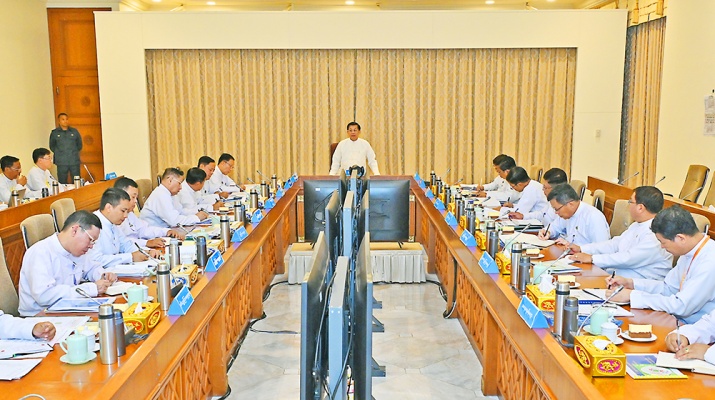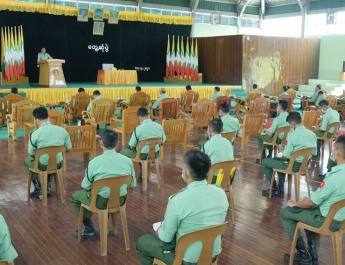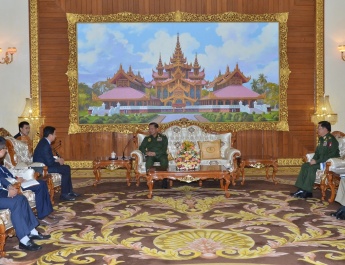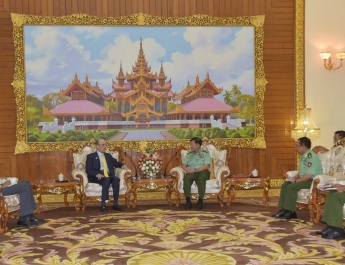Nay Pyi Taw August 6
A meeting on increasing cotton yield, extending crop cultivation and developing livestock was held at State Administration Council Chairman’s Office here this afternoon. Chairman of State Administration Council Prime Minister Senior General Min Aung Hlaing participated in the discussions.
Also present were Union Minister for Planning and Finance U Win Shein, Union Minister for Agriculture, Livestock and Irrigation U Min Naung, Union Minister for Cooperatives and Rural Development U Hla Moe, Union Minister for Industry Dr Charlie Than, deputy ministers, directors general and officials.
In his discussions, the Senior General said he has often discussed the topic on development of the agricultural sector at the relevant meetings and seminars.
Farming is the country’s main business activity. Hence, development of the agro-based good production business has become a must and the development of the main crops, rice, beans, cotton and oil crops, is the primacy in this task.
Although oil crops such as groundnut, sesame, panhnan, sunflower and palm oil, are thriving well in Myanmar, the country has to import cooking oil annually. Normally, groundnut and sesame are consumed as cooking oil, exported and used as an ingredient for making traditional foods. But the production cost is high as the crops have not meeting the targeted yield yet. Another requirement is the quality of milling machines.
As sunflower is also a costeffective oil crop, it should be cultivated systematically in accord with the four main necessities, seeds, soil, water and technology, to meet the set target and famers must be provided with incentives. Actual progress in sunflower cultivation will benefit the country much. So, its sown acreage must be increased annually and it should also be cultivated as a mixed crop. Sunflower seeds must be available. Increase in oil crop production will ensure local cooking oil sufficiency. For certain reasons, the country’s palm oil yield is still low. Unprocessed palm oil is used as an industrial raw material. But means to turn raw palm oil into edible oil should be sought.
Systematic beekeeping that supports agriculture in a way must be carried out to produce honey.
Although the country put about 500,000 acres of land under cotton last year, the output rate was low. Cotton can be turned into cotton fiber, short staple cotton and cotton seeds from which cotton oil and animal feed are derived. Cotton fibers that are converted into long staple cotton can be used as raw material for manufacturing high quality cotton yarn.
Myanmar is included in the main cotton growers, and cotton cultivation is much supportive of the country’s textile and garment industry. The country will earn more if it produces cotton yarn and cotton fabric, and the increase in cotton yarn production is the responsibility of the industrial sector. The country will see surge in income by turning local cotton into quality items.
The country should enter the new age through the establishment of a cotton-based industry. In this way, it will open more job opportunities, increase per capita income, and eventually improving the economy of cotton farmers and cotton-related businesses.
Hence, the country must strive to reclaim the former cotton cultivation target of about 700,000 acres. Hence, collective discussions and suggestion from the participants is invited.
Production of oil from cotton seeds and oil crops, as well as the need for quality oil extraction machines to produce high-quality oil, is essential. It is necessary to carry out agricultural production with industrial processes, which require financial resources.
Previously, funds have been provided for national economic development, and if necessary, the government will provide additional funds. If production from oil crops and sesame cultivation can be improved, it will greatly benefit our country.
Regarding rice, it is necessary to work towards achieving target yields and increasing productivity.
This includes expanding summer rice cultivation, double cropping rice, planting other crops after rice, and replanting summer rice. Improving productivity will significantly benefit the country. To achieve successful agricultural operations, it is necessary to cultivate with quality seeds, soil, water, and techniques to achieve target yields. Our country already has good water and soil conditions for successful agricultural operations.
Therefore, it is hoped that all attendees will discuss and work towards achieving target yields.
Regarding livestock, it is necessary to carry out systematic livestock farming. Success has been seen with systematic breeding of local cattle, pigs, chickens, and goats. Similarly, good breeds should be raised for better outputs. Necessary animal feeds for livestock farming are locally available. Waste materials from systematic livestock farming can be used as bio-fertilizer in agriculture.
Agriculture and livestock farming are mutually beneficial activities. Therefore, discussions are encouraged for the development of livestock farming.
Following this, Union Minister for Agriculture, Livestock, and Irrigation U Min Naung discussed plans for cotton cultivation and production of high-quality cotton seeds, expansion of sunflower oil crop cultivation, conditions of dairy farming and dairy product production, and ongoing efforts for the development of dairy farming. The Union Minister for Cooperatives and Rural Development U Hla Moe also discussed the status of cooperative societies formed for cotton cultivation by state and region, provision of necessary funds for inputs, status of cultivation completion, provision of necessary seeds and inputs for expanding sunflower oil crop cultivation, the cooperative system’s role in operating these businesses and the implementation of livestock breeding tasks through cooperative system and Emerald Green projects.
Union Minister for Industry Dr. Charlie Than discussed the status of oil milling, yarn, textiles, domestic garment production, and the distribution status of garment production by state and region. Workshops on action plans for the development of the value chain from cotton cultivation to textile production have been conducted. Additionally, the status of oil mill registration and production capacity by state and region, efforts to increase domestic oil production for local consumption, workshops for the development of domestic oil mills, and the resulting outcomes were discussed. Union Minister for Planning and Finance U Win Shein explained the provision of low-interest loans from the Myanmar Agricultural Development Bank for agricultural production costs based on crop types, and the provision of loans for agricultural and livestock operations from the national economic development fund to ministries, states, and regions.
Attendees then discussed issues related to the industrial production of cotton, development of oil crops and cotton cultivation, development of dairy farming, and livestock farming operations.
Concerning the reports, the Senior General made additional remarks, saying it is necessary to establish systems for accumulating capital investments for cultivation of crops. The cooperative system is the most appropriate system, which amounts to helping each other through groups. It will be of great benefit by collectively ploughing, cultivating, harvesting and selling crops by implementing the cooperative system. It is necessary to distribute edible oil produced through cooperative farming in the region and to other regions and states. To do so it is necessary for cooperative societies to connect with each other and to strike the balance of ratios of oil mills and oil raw materials.
If necessary, measures must be taken to make high quality machines. It is also necessary to encourage not only the Ministry of Industry but also private factories to do so.
In connection with livestock breeding, priority must be given to local systematic livestock breeding. It is necessary to implement such livestock breeding tasks through the cooperative system. Measures must be taken to regulate livestock breeding tasks systematically. Collective efforts must be made to enhance the quality the raw materials produced. Tasks must be carried out at the minimum cost successfully.
Then, the Senior General made concluding remarks, saying the meeting today highlighted the importance of expansion of cultivation of oil drops and cotton and development of milk cow breeding for development of the country. It is necessary to take measures for cultivation of sunflower as a national objective.
As the demand for dairy products, imports of dairy products from other countries can be greatly reduced if high quality dairy products can be domestically produced. To make necessary raw materials available at home, local livestock breeding tasks must be carried out successfully and production of manufacturing industries must be boosted to ensure the security of food, water and basic needs.
If edible oil and cotton cultivation, which are especially important for the country, industries and services related to them will make progress. It is necessary to disseminate important points of today’s discussions to staff on the ground at different levels.
Efforts must be made for availability of quality strains for agriculture and livestock breeding and systematic livestock breeding.
Priority must be given to successful implementation of today’s discussions for respective sectors. The meeting concluded in the evening.





